Key takeaways:
- Location is crucial for attendee convenience; consider traffic, parking, and accessibility when choosing a venue.
- Evaluate total costs versus benefits; hidden fees can turn a low-cost venue into a pricey option.
- Amenities and services offered greatly affect the event experience; inquire about available support and customization options.
- Ambiance significantly influences engagement and interaction; a well-designed space fosters connections among attendees.
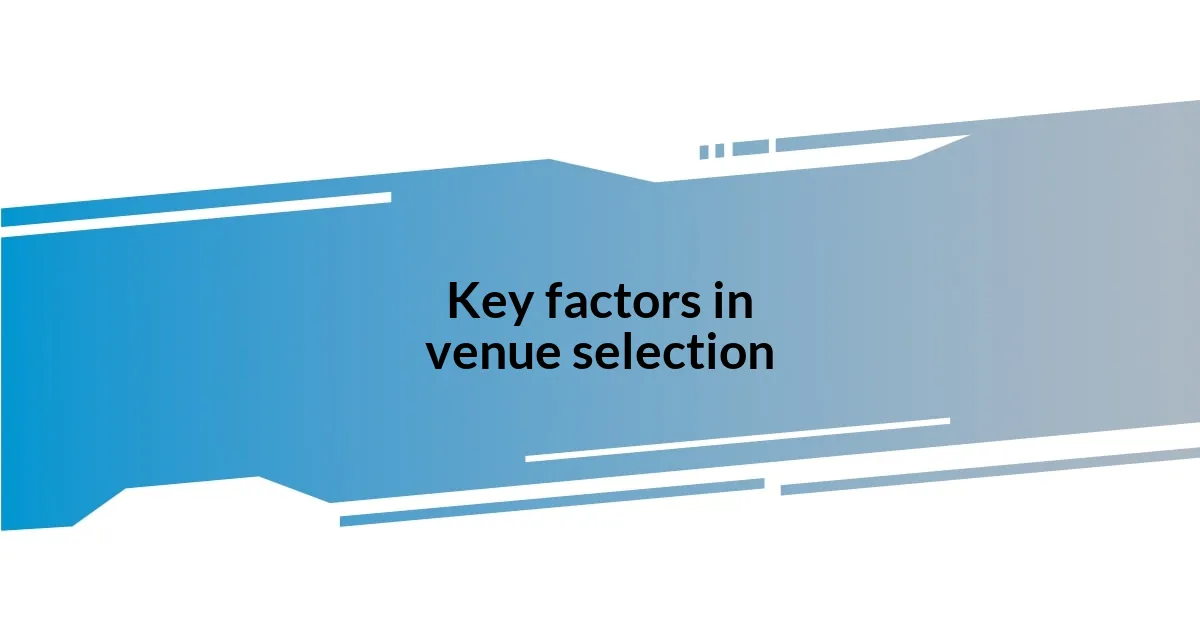
Key factors in venue selection
When choosing a venue, I always consider location first. I remember one event held in a beautiful space, but many attendees complained about the traffic and limited parking options. Did the stunning views really offset the hassle? For me, convenience is key.
Another crucial factor is capacity. I once attended a gathering where the venue was too small, making it feel cramped and uncomfortable. I couldn’t help but wonder how many people chose not to come because they feared that they’d be packed like sardines. Finding a space that comfortably fits your audience not only creates an inviting atmosphere, but it also directly influences the success of your event.
Lastly, I can’t stress enough the importance of amenities. For instance, during a recent conference, the venue had incredible technology for presentations, which made a significant difference in audience engagement. Have you ever been in a place that lacked the necessary equipment? It’s frustrating and often leads to a disjointed experience. Considering what facilities are available can make or break the overall vibe of your event.
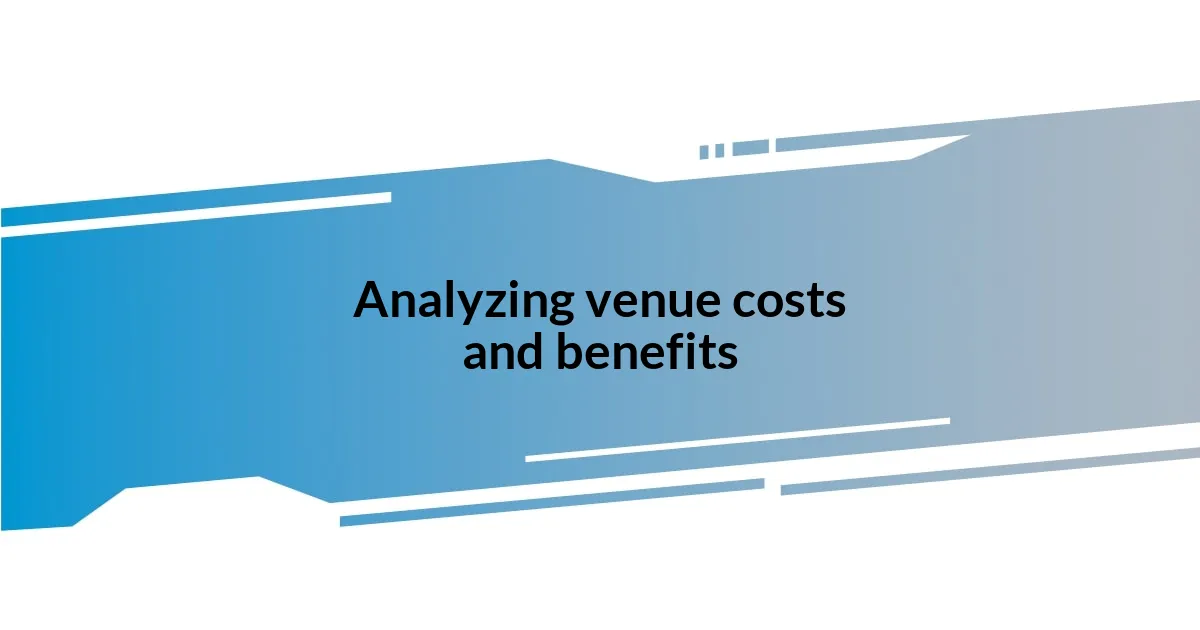
Analyzing venue costs and benefits
Analyzing venue costs and benefits requires a nuanced look at both the financial aspects and the overall experience they provide. I recall evaluating a venue that boasted a lower rental fee but included hidden costs for basic services like lighting and sound. It was an eye-opener for me; the allure of a bargain can quickly evaporate when the final tally comes in. Being transparent about all costs can save a lot of frustration later.
On the other hand, I attended a premium venue that seemed hefty on the budget but provided exceptional value through inclusive services and exceptional ambiance. The experience was so impactful that I left thinking the investment was entirely worth it. Isn’t it interesting how a little extra upfront can lead to a more memorable experience? It taught me that sometimes, spending more can yield a far greater return on investment in terms of guest satisfaction and event success.
When weighing costs against benefits, I always create a comparison table to get a clearer picture. It’s a simple tool, but it can reveal insights that just looking at numbers can’t.
| Aspect | Venue A (Low Cost) | Venue B (High Cost) |
|---|---|---|
| Rental Fee | $1,000 | $2,500 |
| Hidden Fees | $500 | $0 |
| Guest Capacity | 100 | 200 |
| Facilities Provided | None | Inclusive |
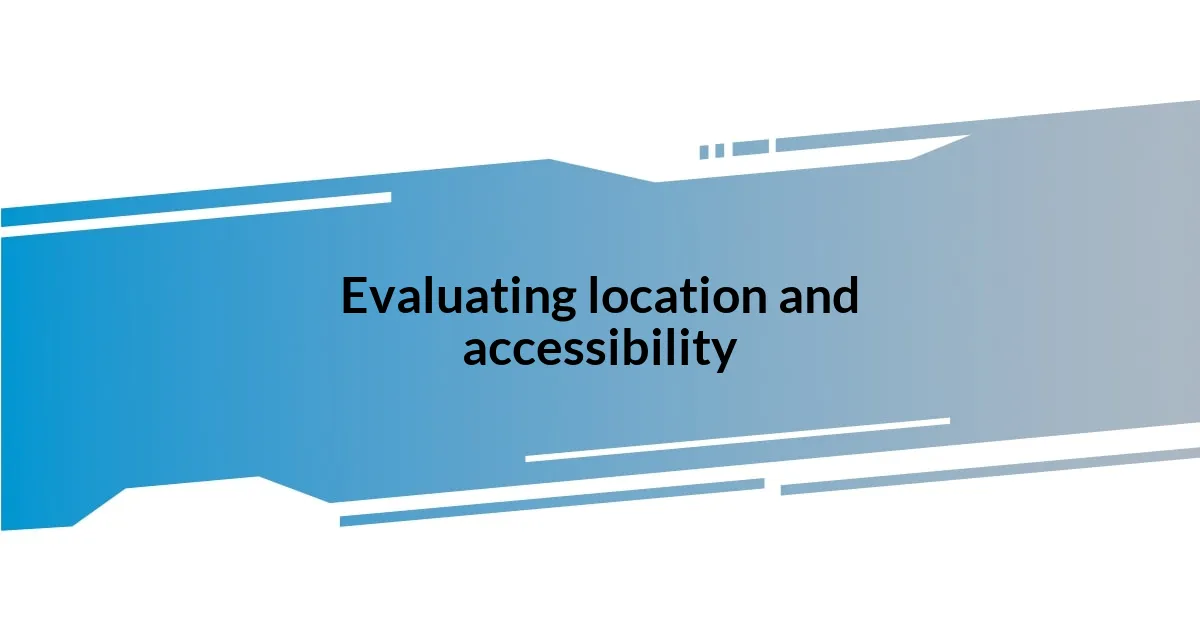
Evaluating location and accessibility
Evaluating location and accessibility is more than just picking a dot on the map; it’s about understanding the nuances that come with it. I learned this during an event I planned in a chic downtown venue. While the space was gorgeous, the venue’s location was surrounded by limited public transit options and sparse accommodations. Many potential attendees opted out, affecting our turnout. It reinforced my belief that a stunning venue means little if people can’t get to it easily.
Here’s a checklist of factors to keep in mind while assessing location and accessibility:
- Proximity to Public Transportation: Is the venue near bus or train stations?
- Parking Availability: Are there enough parking spots for guests?
- Accommodations: How close are hotels or lodgings for out-of-town attendees?
- Accessibility Features: Are there ramps or elevators for those with mobility issues?
- Traffic Patterns: What does the traffic look like at the time of your event?
Reflecting on this experience makes me prioritize convenience when selecting venues. It’s not just about the venue itself; it’s about creating an environment where everyone feels welcome and can easily participate.
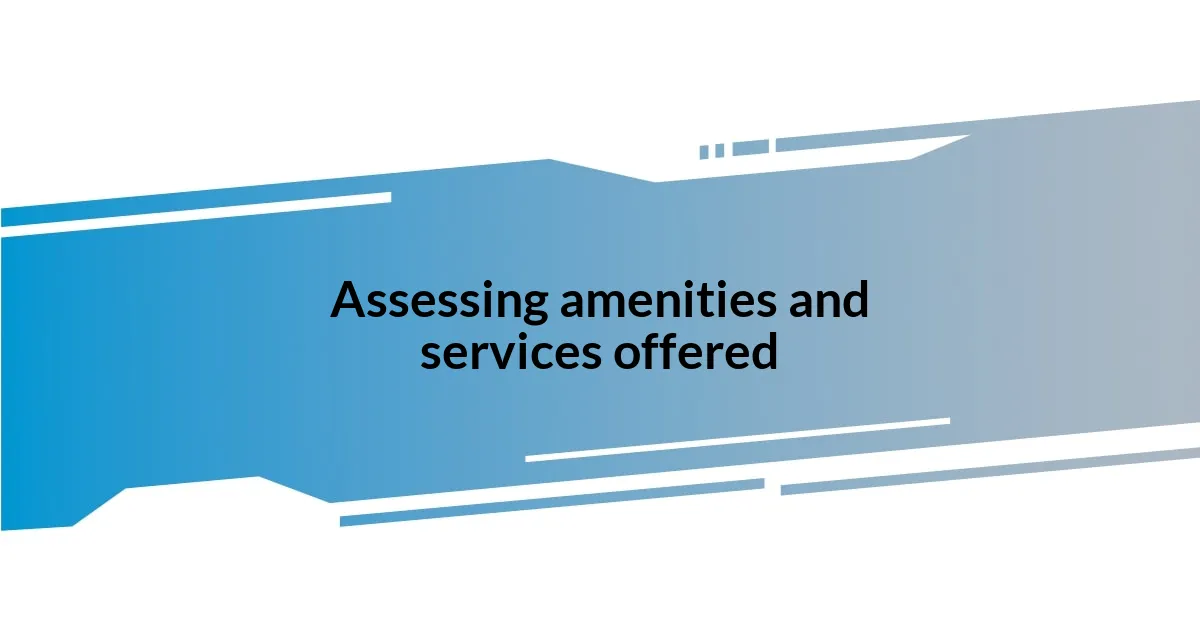
Assessing amenities and services offered
When assessing the amenities and services offered by a venue, I find it crucial to look beyond the surface. One time, I visited a venue that highlighted its spacious ballroom but overlooked the fact that it lacked essential services like catering and AV support. I remember feeling a bit deceived; it felt like a beautiful shell without the content I truly needed. Isn’t it perplexing how a venue can shine in appearance but fail to deliver on practical needs?
I’ve also experienced the difference that extra services can make. At a recent venue, they not only provided tables and chairs but also upgraded the linens and offered a fantastic setup team. The added touch made everything feel polished and professional. It reminded me that sometimes, it’s those little extras that elevate an event from ordinary to extraordinary. Have you ever noticed how a small detail, like a well-set table, can change the whole atmosphere?
Lastly, I believe it’s essential to ask questions about a venue’s services during the consultation. One venue I considered mentioned that they partnered with local vendors, which opened up exciting possibilities for customization. Understanding what’s available allows for a more tailored experience. It’s that personal connection with the venue’s offerings that can often seal the deal for me.
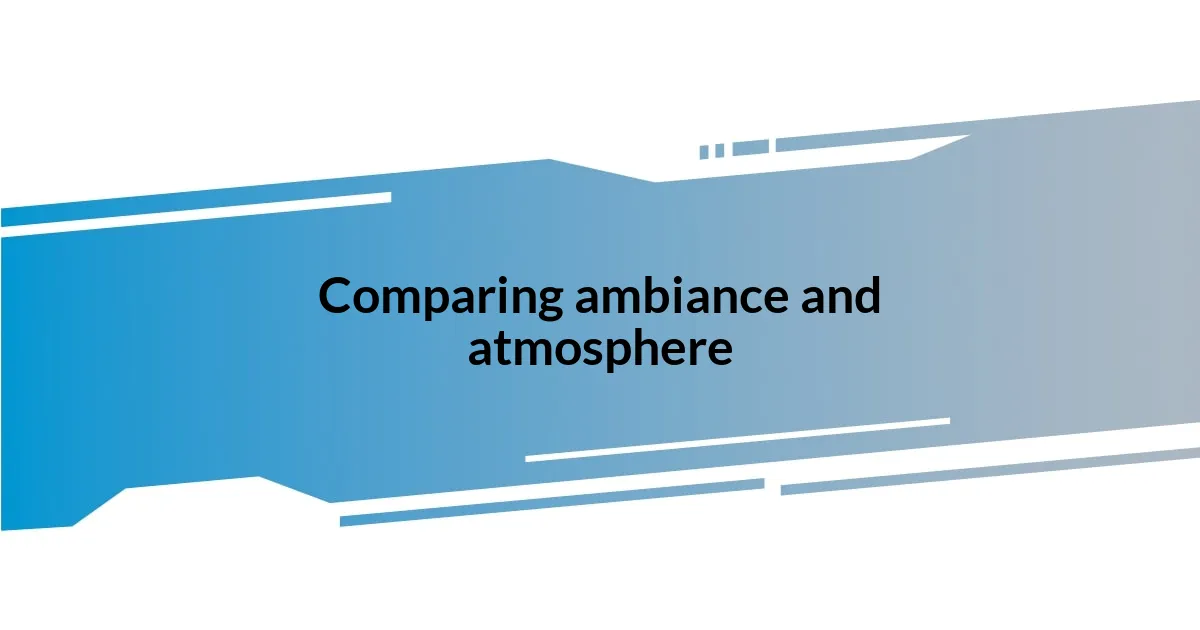
Comparing ambiance and atmosphere
When I think about ambiance and atmosphere, I realize how profoundly they influence the event experience. I once hosted a gathering in a venue with breathtaking views and soft, ambient lighting. The attendees were instantly captivated, and that warm atmosphere encouraged open conversations and connections. It’s fascinating how the right setting can bring out the best in people, don’t you think?
I remember contrasting two venues for a recent corporate retreat. One had stark white walls and fluorescent lighting, making it feel more like a sterile office than a creative workspace. In comparison, the other had vibrant colors, unique art, and cozy seating arrangements that invited collaboration. I concluded that the latter not only improved our productivity but also fostered a sense of community among team members. Isn’t it incredible how a few design choices can alter the entire vibe of an event?
Additionally, I’ve learned that music plays a pivotal role in setting the atmosphere. At one venue, the background music was too loud, making it difficult for guests to engage in meaningful conversations. This experience taught me that the right sound can enhance the mood significantly while the wrong choice can detract from the overall experience. I now prioritize spaces where the ambiance is curated thoughtfully, as it’s these details that ultimately shape the memories we create.